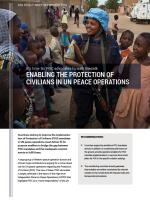Protection of civilians in UN peacekeeping - action is needed
A large group of western peace operation donors and African troop contributors argues for a more robust role for UN peace operations in the Protection of Civilians (POC). The view of these “POC advocates” is largely reflected in the recent report of the High-level Independent Panel on Peace Operations that highlights POC as a “moral responsibility” of the UN.
POC is a cross-cutting challenge that spans a range of activities, including mediation, prevention, monitoring, early warning, and physical protection. POC can be implemented and supported by local authorities and external actors often in civilian capacities. Still, the ability to effectively provide military responses to imminent threats to civilians in contexts where UN peacekeepers are mandated to supplement or substitute other protection efforts remain a central concern to POC advocates.
In this policy brief, Frederik Rosén and Kristoffer Nilaus Tarp argue that countries wishing to improve the implementation of POC mandates in UN peace operations must deliver fit-for-purpose enablers to bridge the gap between POC mandates and the inadequate commitments to fulfil these.
POC-enablers may comprise various ways of enhancing mission capabilities that can be delivered also by countries seeking alternatives to large-scale troop deployments – from assessments and planning capabilities over teaching and training to medical units, specialized technology, and airlift contributions.
The authors argue that POC advocates can consider four overall categories of such capabilities and provide a brief introduction to some of the most needed capabilities.


